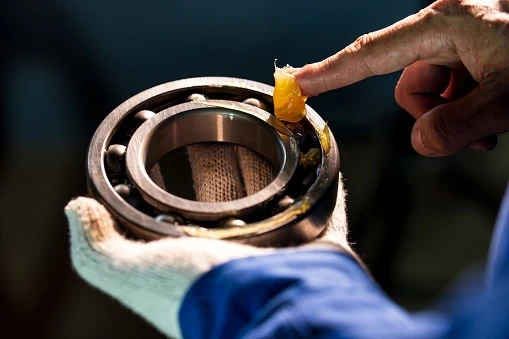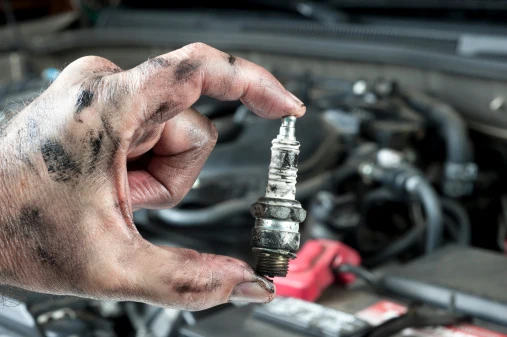It’s important to use dielectric grease on spark plugs for two reasons. First, it helps keep moisture out of the plug holes. Second, it ensures that the electrical connection between the plug and the boot is good. If you don’t use dielectric grease, you may find that your spark plugs fouling or that your engine is misfiring.
How to Use Dielectric Grease on Spark Plugs
The best way to apply dielectric grease to spark plugs is with a small pastry brush. You can also use your fingers, but be sure to wear gloves so you don’t get the grease on your skin. Squeeze a small amount of grease onto the plug, and then spread it around the hole with the brush or your fingers. Be sure to get the grease all the way down into the hole.
Once the grease is in place, reattach the plug boot. Make sure it’s snug against the plug, and then use a zip tie or some other type of fastener to hold it in place. Repeat this process for each spark plug.
Now your spark plugs are ready for installation. Just be sure to clean off any grease that gets on the outside of the plug before you screw it into the engine. Dielectric grease is an important part of keeping your spark plugs in good condition, so be sure to use it every time you change your plugs.
What Is Dielectric Grease Made of??
Dielectric grease is made of a variety of materials, including silicon oil, aluminum oxide, and mica. These materials work together to create a substance that is both electrically and thermally insulating. This helps keep moisture out of the plug hole and ensures a good electrical connection between the plug and the boot.
Difference Between Dielectric Grease and Lubricating Grease
Dielectric grease is not the same as lubricating grease. Lubricating grease is made of a variety of oils and other lubricating materials, and it helps to reduce friction between moving parts. Dielectric grease, on the other hand, is designed to insulate and protect electrical connections. It’s important to use the right type of grease for each application to ensure optimal performance.
How Often Should You Use Dielectric Grease?
You should use dielectric grease any time you change your spark plugs. This will help keep moisture out of the plugs and ensure a good connection between the plug and the boot. You can also use it on other electrical connections, such as trailer hitch wiring and battery terminals. Just be sure to read the manufacturer’s instructions to make sure the grease is compatible with the materials involved.
Dielectric grease is an important part of keeping your spark plugs in good condition, so be sure to use it every time you change your plugs.
Will Dielectric Grease Worsen a Connection???
No, dielectric grease will not worsen a connection. In fact, it can actually improve the connection by keeping moisture out of the plug hole and ensuring good electrical contact between the plug and the boot.
Can Dielectric Grease Be Used on Other Connections?
Yes, dielectric grease can be used on other electrical connections, such as trailer hitch wiring and battery terminals. Just be sure to read the manufacturer’s instructions to make sure the grease is compatible with the materials involved.
When To Use Dielectric Grease
Dielectric grease should be used any time you change your spark plugs. This will help keep moisture out of the plugs and ensure a good connection between the plug and the boot. You can also use it on other electrical connections, such as trailer hitch wiring and battery terminals. Just be sure to read the manufacturer’s instructions to make sure the grease is compatible with the materials involved.
How Much Dielectric Grease Should I Use?
You only need a small amount of dielectric grease for each spark plug. Squeeze a small amount onto the plug, and then spread it around with a brush or your fingers. Be sure to get the grease all the way down into the hole. You don’t want to use too much, or the grease will just come out when you screw in the plug.
How Do I Remove Dielectric Grease?
If you need to remove dielectric grease from a surface, you can use a solvent such as acetone or isopropyl alcohol. Apply the solvent to a rag and then wipe it over the surface to remove the grease. You may need to repeat this process several times to get all of the greases off. Be sure to dispose of the solvent properly when you’re done.
When should you not use dielectric grease?
You should not use dielectric grease on surfaces that will come into contact with food, as it may be harmful if ingested. You also shouldn’t use it on surfaces that will be exposed to high temperatures, as it can melt and cause damage. Always read the manufacturer’s instructions before using dielectric grease to make sure it is safe for the intended application.
Do you put anything on spark plug threads?
Some people put a small amount of dielectric grease on the threads of spark plugs to help keep them clean and dry. This is not necessary, but it can help prevent corrosion and make it easier to remove the plugs in the future. Be sure to wipe off any excess grease before installing the plugs.
Sometimes You Need a Certified Mechanic
While dielectric grease is a great way to prevent moisture and corrosion, it’s important to note that it is not a substitute for proper maintenance. If your electrical connections are loose or damaged, you may need to have them repaired or replaced by a certified mechanic. Dielectric grease can help extend the life of your connections, but it won’t fix a bad connection. Be sure to inspect your connections regularly and seek professional help if you notice any problems.
FAQ’s
Q: Can Dielectric Grease Cause a Short Circuit?
A: No, dielectric grease will not cause a short circuit. In fact, it can actually help prevent shorts by keeping moisture out of the connection.
Q: What Happens if I Use Too Much Dielectric Grease?
A: You only need a small amount of dielectric grease for each spark plug. Squeeze a small amount onto the plug, and then spread it around with a brush or your fingers. Be sure to get the grease all the way down into the hole. You don’t want to use too much, or the grease will just come out when you screw in the plug.
Q. Can I Use Dielectric Grease on My Car?
A: Yes, you can use dielectric grease on your car. It can be used on electrical connections, such as spark plugs, battery terminals, and trailer hitch wiring. Just be sure to read the manufacturer’s instructions to make sure the grease is compatible with the materials involved.


